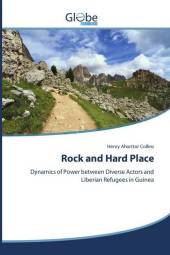 Neuerscheinungen 2014Stand: 2020-02-01 |
Schnellsuche
ISBN/Stichwort/Autor
|
Herderstraße 10
10625 Berlin
Tel.: 030 315 714 16
Fax 030 315 714 14
info@buchspektrum.de |

Henry Ahorttor Collins
Rock and Hard Place
Dynamics of Power between Diverse Actors and Liberian Refugees in Guinea
2014. 124 S. 220 mm
Verlag/Jahr: GLOBEEDIT 2014
ISBN: 3-639-47736-7 (3639477367)
Neue ISBN: 978-3-639-47736-8 (9783639477368)
Preis und Lieferzeit: Bitte klicken
Rock and Hard Place depicts predicaments of a "miserable sea" of Liberians refugees in Guinea from early 1990s to June 2012. Warfare for fourteen years resulting to state break-down put the exiles into "protracted refugee" category, which led to slashing of vital services and humanitarian assistance for these refugees. Forced to find alternative sustenance, they became constantly embroiled in menacing trajectories. A wider context to perpetrating improprieties by personnel of the UNHCR, other humanitarian agencies, as well as Guinean authorities crossed the line into steady abuse of power, sexual harassment and rape of vulnerable females with impunity. Child labor was widespread on the streets, farms and illicit mines in Guinea, and refusal by the locals to remunerate for services of the refugees epitomized not only weapon of power but also intimidation, marginalization and inequality. Following cessation of their status as refugees on 30th June 2012, the option they have made between repatriation and integration defined their future. Whether or not the, now former, Liberian refugees would continue to be stuck between "rock and hard place", depends on their own urge and aspiration to accomplish goals and ambitions.
Henry Ahorttor Collins holds MA in Social Anthropology from the University of Bergen inNorway. The daily lived experiences in Guinea for ten years exposed him to issues andpredicaments of Liberian refugees. "Rock and Hard Place", examines dynamics of powerbetween the UNHCR, Guinean authorities and the locals on one hand, and Liberian refugeesin Guinea on the other. Employing participant observer and observing participant as pointof departure, he explores the various elements of power through the lens ofinsider-outsider.


